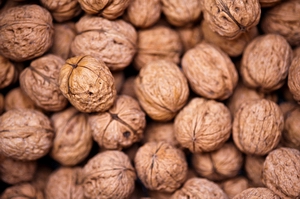 of type 2 diabetes mellitus in women.
of type 2 diabetes mellitus in women.The study published in the Journal of Nutrition shows that women who ate two or more servings of walnuts per week were 33% less likely to be diagnosed with type 2 diabetes mellitus, compared with those who rarely ate walnuts.
The authors say that walnuts are high in polyunsaturated fatty acids and prior research shows walnuts improve cardio-metabolic risk factors. T he current study was intended to investigate the association between walnut consumption and the risk of type 2 diabetes mellitus.
The study was based on data from 58,063 women aged 52 to 77 years in the Nurses’ Health Study (NHS) and 79.893 women aged 35 to 52 years in NHS II. All participants were free of diabetes mellitus, cardiovascular disease and cancer at baseline. Walnut consumption was surveyed every four years and 5,930 incident type 2 diabetes cases were reported during a 10-year follow-up.
After adjustment for body mass index, the association between walnut consumption and the risk of type 2 diabetes was attenuated. T he reduction in the risk of type 2 diabetes in women eating the highest amount was 26%.
Other nuts may also help. The researchers found intake of total nuts and other tree nuts was inversely correlated with the risk of type 2 diabetes mellitus, but this association was more strongly associated with body mass index than nut consumption. In other words, the association between consumption of total nuts and the risk of diabetes was less significant than that between walnut consumption and the risk of type 2 diabetes.
The researchers concluded "Our results suggest that higher walnut consumption is associated with a significantly lower risk of type 2 diabetes in women."
Studies have shown that eating high fat and high sugar diet can increase the risk of type 2 diabetes.
Type 2 diabetes mellitus affects an estimated 26 million Americans. Doctors say there is no cure for the disease, which can lead to serious complications. But studies suggest that many preventive measures can be taken to prevent the disease. For instance, prior research in India suggests that taking curcumin in a dose of 6 grams per day can help effectively prevent the development of type 2 diabetes mellitus in people with pre-diabetes.





